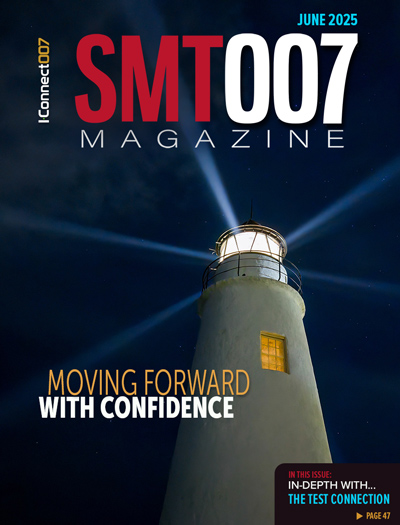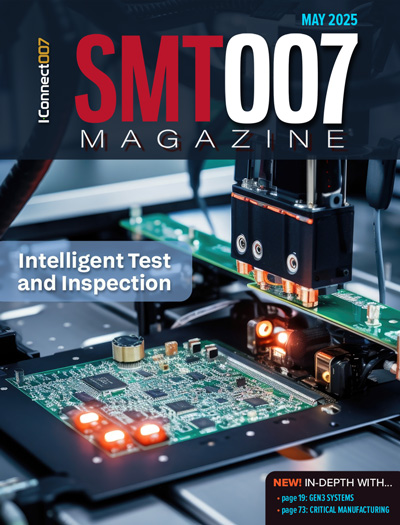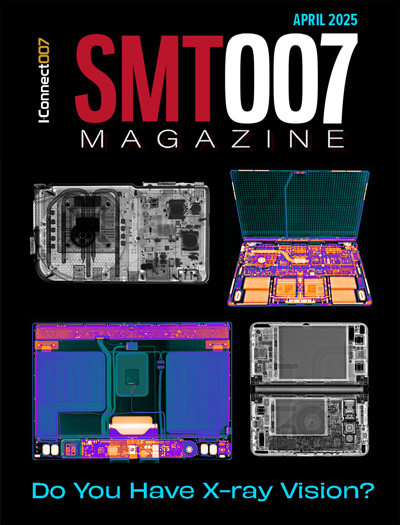-

- News
- Books
Featured Books
- smt007 Magazine
Latest Issues
Current Issue
Moving Forward With Confidence
In this issue, we focus on sales and quoting, workforce training, new IPC leadership in the U.S. and Canada, the effects of tariffs, CFX standards, and much more—all designed to provide perspective as you move through the cloud bank of today's shifting economic market.

Intelligent Test and Inspection
Are you ready to explore the cutting-edge advancements shaping the electronics manufacturing industry? The May 2025 issue of SMT007 Magazine is packed with insights, innovations, and expert perspectives that you won’t want to miss.

Do You Have X-ray Vision?
Has X-ray’s time finally come in electronics manufacturing? Join us in this issue of SMT007 Magazine, where we answer this question and others to bring more efficiency to your bottom line.
- Articles
- Columns
Search Console
- Links
- Media kit
||| MENU - smt007 Magazine
Tempo Automation: Setting the Pace for Low-Volume, Quick-Turn Assembly
January 31, 2018 | Patty Goldman, I-Connect007Estimated reading time: 14 minutes
While on the SMTA International show floor, my good friends Michaela Brody and Paul Benke tracked me down and suggested I talk with Jesse Koenig. They told me he had an intriguing story, and sure enough, he did.
Patty Goldman: Hi Jesse, please tell me about your company, Tempo Automation.
Jesse Koenig: We started the company mid-2013, so it’s relatively new. We had the same overarching goal then that we have now, which is to make electronics development much easier and more seamless for our customers, electrical engineers, to let them spend their time on what they're good at, which is designing electronics, instead of on manufacturing logistics. That's always been the goal of our company.
We started by riding the wave of the 3D printer revolution to make a desktop PCB assembly machine that would do solder paste deposition, pick and place, and optical inspection. We spent about a year and a half developing those robots. Many engineers were excited about it, but after a lot of research and talking to customers and testing out that robot with customer jobs, we began to realize there's a much bigger market for taking care of the entire process for the customer and making it more integrated into their workflow.
When we were going to build and sell these robots, a lot of what we were doing was developing the software to run the robots and making it much easier for that process to fit into the customer’s CAD design process. We're still focusing heavily on software but now we're selling our service instead of selling a machine. We're buying what we find to be the best available hardware, the best available machines, and then focusing our engineering resources on software development. So, we’re building our own software for the customer to interface with, and to run our factory.
Goldman: What is your position in the company?
Koenig: I'm a co-founder and VP of Technology. I oversee our facilities, equipment, PCB vendors, and some aspects of software development. I work with our software engineers, doing product management for the software that will interface with the various machines, robots, manufacturing personnel, and PCB vendors, making sure the proper data and algorithms are being manifested in the software.
Goldman: And what does your factory do?
Koenig: Our service is turnkey PCB assembly, so a customer uploads their CAD design to our web application and they get information like DFM feedback and they can process their bill of materials themselves. Our software has access to the inventories of our distributors so we can go through a customer’s BOM, make sure the part numbers are real part numbers, that there are no inconsistencies in their BOM. For example, a quantity that doesn't match the number of reference designators in their BOM—we point out things like that, which would normally be a phone call or email a couple days later.
We display these things in real time, tell them if a part is not in stock at distributors and let them select a different, equivalent one from a list we display or choose to send us the part. Then we give them a quote that shows them why it costs what it does and why it takes as long as it does. So we give them opportunities to make changes, make it faster or less expensive. And then they press the order button and three days later they have the boards in hand, assembled and inspected by X-ray and AOI.
Goldman: Who makes the bare boards?
Koenig: We have a few partner companies with arrangements to get the fastest turn times. We're getting most of our bare boards with a one-day turn time, and we have arrangements with these partners where we have our systems synchronized so we can send them orders without getting quotes first, to make it even faster.
Goldman: Is this largely for prototypes?
Koenig: Yes, largely prototypes. Our quantities are one to 250. Someday in the future I think there may be applications for the kinds of technology and software and automation that we develop to get into higher volume projects, but right now we're just focused on being the absolute best at low volume.
Goldman: You see a need there.
Koenig: We see a huge need there and the difference is greater there. In other words, when you're only making 10 boards, if you have to do a ton of manual set up, if there's a lot of human labor that goes into it at the front of the process to get 10 boards made, that hurts a lot more than if you're making 10,000 or 100,000 boards. That upfront cost is not as bad then. The difference with our software and automation is you get a bigger delta on smaller jobs. That's where we focus now because we can give customers a dramatically better experience than they have at other places.
Goldman: How long have you been doing this part of it? I know you were working on something else before.
Koenig: We set up in our current facility in the first quarter of 2016—that’s when we set up the SMT lines that we now have. We're growing now; we just raised a financing round and so we will be hiring more software engineers. There’s a lot of technology that we want to add to make the customer experience even better, to make turn times even faster, and to make quality even higher. Then we will be adding equipment, too—adding SMT lines. And we’ll be moving into a much larger facility in 2018.
Page 1 of 3
Suggested Items
SolderKing’s Successful Approach to Modern Soldering Needs
06/18/2025 | Nolan Johnson, I-Connect007Chris Ward, co-founder of the family-owned SolderKing, discusses his company's rapid growth and recent recognition with the King’s Award for Enterprise. Chris shares how SolderKing has achieved these award-winning levels of service in such a short timeframe. Their secret? Being flexible in a changing market, technical prowess, and strong customer support.
Preventing Surface Prep Defects and Ensuring Reliability
06/10/2025 | Marcy LaRont, PCB007 MagazineIn printed circuit board (PCB) fabrication, surface preparation is a critical process that ensures strong adhesion, reliable plating, and long-term product performance. Without proper surface treatment, manufacturers may encounter defects such as delamination, poor solder mask adhesion, and plating failures. This article examines key surface preparation techniques, common defects resulting from improper processes, and real-world case studies that illustrate best practices.
Breaking Silos with Intelligence: Connectivity of Component-level Data Across the SMT Line
06/09/2025 | Dr. Eyal Weiss, CybordAs the complexity and demands of electronics manufacturing continue to rise, the smart factory is no longer a distant vision; it has become a necessity. While machine connectivity and line-level data integration have gained traction in recent years, one of the most overlooked opportunities lies in the component itself. Specifically, in the data captured just milliseconds before a component is placed onto the PCB, which often goes unexamined and is permanently lost once reflow begins.
BEST Inc. Introduces StikNPeel Rework Stencil for Fast, Simple and Reliable Solder Paste Printing
06/02/2025 | BEST Inc.BEST Inc., a leader in electronic component rework services, training, and products is pleased to introduce StikNPeel™ rework stencils. This innovative product is designed for printing solder paste for placement of gull wing devices such as quad flat packs (QFPs) or bottom terminated components.
See TopLine’s Next Gen Braided Solder Column Technology at SPACE TECH EXPO 2025
05/28/2025 | TopLineAerospace and Defense applications in demanding environments have a solution now in TopLine’s Braided Solder Columns, which can withstand the rigors of deep space cold and cryogenic environments.


